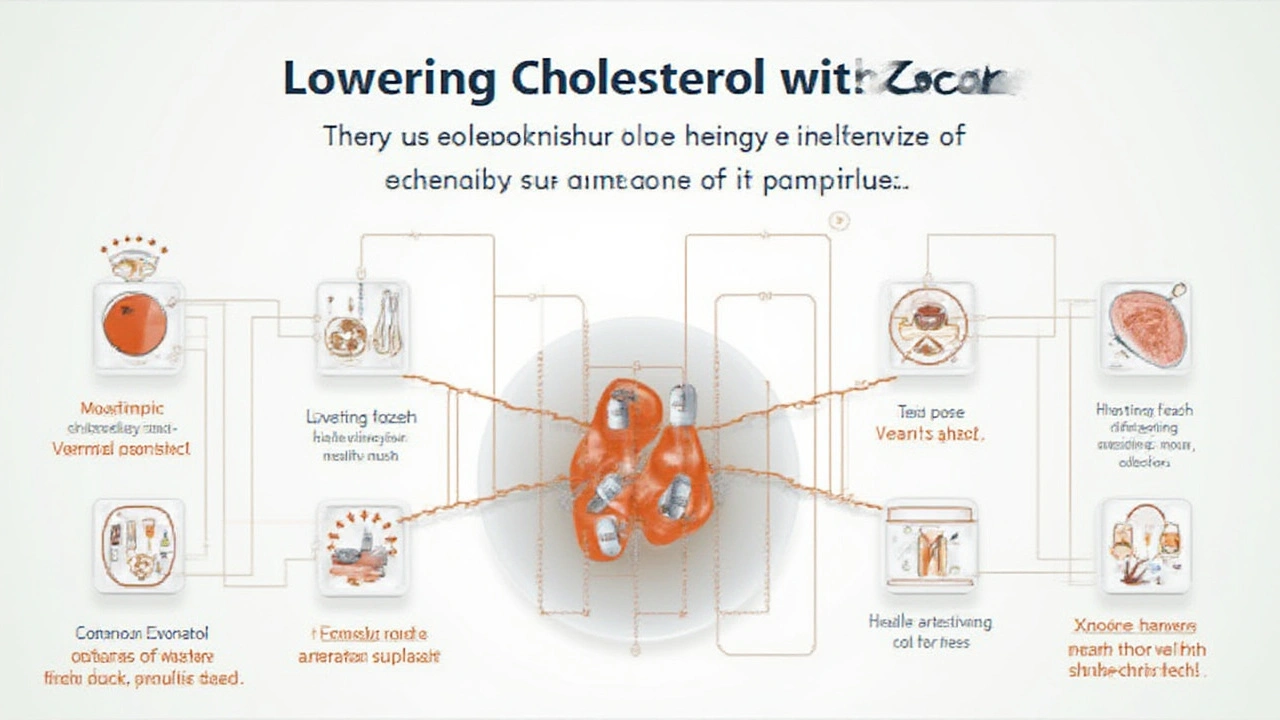Statins Explained: Zocor Uses, Benefits, and How It Lowers Cholesterol
 Jul, 10 2025
Jul, 10 2025
Heart attacks are still the number one cause of death worldwide, and here’s something wild: about one in three adults in the U.S. has too much cholesterol, but way too many don’t even know it. If you’re reading this, maybe a doctor just told you your cholesterol’s up, or the word “statin” popped up after a recent blood panel. Suddenly, you’re bombarded with words like Zocor or simvastatin, and honestly, it’s confusing. Is it just for old folks? How does a simple pill drop all those risk numbers? Let’s bust open the medicine cabinet and see exactly what Zocor is used for, and why it’s become such a game-changer in the fight against heart disease.
Understanding Statins: Why Cholesterol Matters More Than You Think
If you only remember cholesterol as some vague “bad thing” from TV ads, here’s the deal: your body actually needs some of it to work. Cholesterol helps your cells, hormones, and even your digestion. But when there’s too much of the "bad" low-density lipoprotein (LDL) cholesterol floating in your bloodstream, it starts sticking to artery walls, turning into dangerous plaques. Those plaques squeeze your blood vessels tight, blocking off blood to your heart or brain. Suddenly, you’re at risk for heart attacks and strokes—no warning, no second chances.
Enter statins, a class of medications invented by an ambitious Japanese scientist back in the late 1970s. His initial findings were so promising, they launched a 30-year global drug race. The idea is simple: shut off the body’s own cholesterol factory in the liver. Statins, like Zocor (generic name: simvastatin), block an enzyme called HMG-CoA reductase. This enzyme is the literal spark plug for cholesterol production. Turn it down, and your liver goes from a cholesterol factory to a cleanup crew, sucking more LDL out of your blood and recycling it instead of letting it turn into artery-clogging sludge.
But here’s something a lot of people miss: not all cholesterol is evil. There’s also HDL, the so-called “good” cholesterol, which scoops up excess LDL and ferries it back to the liver for disposal. Zocor doesn’t just lower LDL; studies show it can boost your HDL a bit too, so you get more clean-up in every dose. At the same time, it helps drop levels of triglycerides, another fat that, in high doses, piles on more cardiovascular risk.
Doctors usually start thinking about statins when your LDL is over 190 mg/dL, or if you’ve already got risk factors—like high blood pressure, diabetes, or a family history of heart attacks. But even younger adults get a statin wake-up call if their risk calculations light up the chart. And here’s some cold truth: a huge Framingham Heart Study found that over half of heart attack victims had cholesterol numbers in the “normal” range before disaster struck. That’s why guidelines now recommend a personalized approach, weighing your age, family history, smoking habits, and blood test results to see if Zocor (or other statins) make sense for you.

How Zocor (Simvastatin) Works: The Science in Plain English
Zocor isn’t some magical cholesterol eraser. It does real, targeted work inside your liver, which actually produces about 75% of your body’s cholesterol (far more than you get from food). When you pop your dose each night, simvastatin moves through your liver and quietly blocks the HMG-CoA reductase enzyme. Imagine putting the brakes on a car—production slows way down. Suddenly, there’s less new LDL being released. Your liver notices it’s running low and tries to "catch up" by pulling more LDL cholesterol out of your blood, using a clever system of receptors like little Pac-Men. Fewer LDL particles in the bloodstream means less plaque on your arteries down the line.
What makes Zocor a go-to pill? It’s been around since the 1990s, so doctors have decades of experience balancing its dose and tweaking combinations with other drugs. Zocor comes as low as 5 mg and as high as 80 mg, but most folks see solid results around 20 or 40 mg. Doctors aim to drop LDL by at least 30-50% with statins, and Zocor holds up well compared to its siblings like atorvastatin or pravastatin.
Odd fact: Statins work best when taken at night, because your liver churns out more cholesterol while you sleep. That’s why your pharmacist will probably tell you, “Take it with your bedtime snack.” Miss a dose? Don’t double up, just pick up where you left off. Consistency is the unsung hero here—skipping days wrecks the rhythm and leaves plaques lurking.
If you’re worried about “statin side effects,” you’re not alone. Muscle aches pop up in about 5-10% of people, and there’s plenty of debate about how often that’s a real drug effect versus the nocebo effect (where you expect an ache so your body produces one!). Studies consistently show that the real number of people who have to quit because of side effects is actually much lower than most of us guess. The risk of serious problems like liver injury or memory blips is extremely low, though your doctor will check liver enzymes just to be safe. Grapefruit and some certain antibiotics or antifungals can interfere with Zocor, so always keep your medication list handy at checkups.
Wondering about numbers? Here’s a table breaking down how much Zocor can typically change key cholesterol measurements after about 6 weeks of regular use:
| Measurement | Before Zocor | After 40 mg Zocor |
|---|---|---|
| LDL Cholesterol (mg/dL) | 180 | 110 |
| HDL Cholesterol (mg/dL) | 40 | 45 |
| Triglycerides (mg/dL) | 200 | 130 |
That’s a 40%+ drop in LDL, a modest but meaningful HDL boost, and a nice slash in triglycerides in just over a month. Not bad for something you swallow after brushing your teeth.

Who Should Use Zocor – And Who Should Not?
Some people think statins are “just for old men,” but that’s just plain wrong. Zocor is approved for adults and even some children with genetic cholesterol disorders, usually from age 10 and up. It’s mainly used for:
- People with a history of heart attack, stroke, or serious artery disease (to prevent a repeat event).
- Anyone with sky-high LDL (above 190 mg/dL), even if they feel totally fine.
- Those with Type 2 diabetes and at least one other risk factor, since diabetes and heart risk are best buddies.
- Anyone whose risk calculation (age, cholesterol, blood pressure, family history, smoking, diabetes, etc.) points to a one-in-ten or greater chance of having a cardiac event in the next decade.
But Zocor isn’t for everyone. Pregnant people, for example, should skip statins entirely. There’s just not enough safety data, and since cholesterol is crucial for a developing baby, blocking it is a no-go. The same goes for breastfeeding. If you’ve got active liver disease, statins can make things worse, not better. People with certain muscle conditions or serious allergies to statins should talk to their doctor about alternatives—sometimes a different type of cholesterol-lowering medicine makes more sense.
While Zocor has a long record of slashing major heart problems, it’s not a “get out of salad free” card. If you take a statin and ignore everything else—like daily movement, quitting smoking, getting enough sleep, and dialing back those midnight snacks—you’re only fighting half the battle. Research from the American Heart Association shows that combining a statin with healthy habits multiplies your protection. People who managed 30 minutes of brisk walking five days a week saw even bigger cholesterol drops and up to 60% lower heart attack risk compared to statins alone. Think of your statin as a seatbelt: it’s smart, but you’ve got to keep your eyes on the road too.
Wondering about drug interactions? Grapefruit is the biggest, weirdest villain here—it can boost Zocor’s levels in your blood by blocking a liver enzyme called CYP3A4, ramping up the risk of muscle side effects. The more grapefruit juice you gulp, the higher the risk, so it’s best to avoid completely if Zocor’s in your pillbox. Some anti-fungal pills and certain antibiotics can play spoiler, too. Always bring a med list to your appointments, especially if you get prescriptions from more than one doctor.
If all this info is sending your head spinning, you might want to check out a detailed post explaining what is Zocor used for. It covers not just the uses, but also what to expect, and the common things doctors wish their patients remembered.
People sometimes ask if they’ll need Zocor forever. In many cases, yes—stopping statins almost always lets cholesterol creep back up in a few weeks. But, your doctor might re-test your blood after several months or a year, especially if you’ve made huge healthy changes. Rarely, someone with truly spectacular progress can lower their dose, or even stop altogether, but most people need to keep taking their statin long-term for continued protection.
Is Zocor right for you? There’s no one-size-fits-all answer. But if your doctor mentions statins, don’t panic. Ask about your real risks, talk about side effects, and bring up anything else on your mind—most doctors love when a patient is proactive about their heart health. And if you do start on Zocor, remember: it’s not just about lowering a number, it’s about giving your arteries a fighting chance for another decade—and with today’s science, that’s entirely within your reach.
Matthew Ulvik
July 18, 2025 AT 15:50Hey everyone! This breakdown on Zocor is super handy for anyone trying to get their head around cholesterol meds without diving into a sea of medical jargon. 😊
Basically, Zocor (or simvastatin) chills out your liver's cholesterol production by blocking an enzyme, which helps keep those LDL levels down. Docs usually prescribe it not just to lower cholesterol but to prevent heart attacks or strokes, especially for folks at risk.
What I appreciate is how accessible the explanation is—makes it easier to chat with your doctor or even help out family members confused about why they gotta take pills daily. Have any of you been on Zocor? Would love to hear your experiences or if you've noticed real benefits thanks to it. Let's keep it casual and informative!
Dharmendra Singh
July 19, 2025 AT 20:33I appreciate this explanation on Zocor – clear and concise, which is needed because sometimes medical info gets too complicated.
In India, many patients rely on statins when lifestyle changes alone don't cut cholesterol down. This post helps bridge the gap between clinical jargon and everyday understanding, which is crucial for adherence to medication.
It's also important to mention potential side effects such as muscle pain and liver function monitoring. Doctors should always emphasize these while explaining use to patients. Did anyone else feel their doctors skipped this part?
Rocco Abel
July 21, 2025 AT 14:13Honestly, I can't help but wonder if Big Pharma pushes statins like Zocor more for profit than actual health benefits. There's always a shadow side to these medications.
Sure, lowering cholesterol is important, but are we drilling down enough on alternative therapies or the real root causes like diet and stress? Just throwing pills at a problem feels like a Band-Aid on a gaping wound sometimes.
I'm all for medicine, but transparency? That's what I want from the makers of these drugs.
Dawn Mich
July 22, 2025 AT 18:00Amazon rainforest of conspiracy theories here, huh? Lol. But seriously, the whole statin scheme feels like a cozy club between docs and pharma giants wanting your wallet fat, not your arteries. Don't buy it blindly!
Not to mention the side effects they conveniently downplay. Ever heard of rhabdomyolysis? No? Look it up. A friend nearly got wrecked.
People gotta wise up and critically assess this 'cholesterol lowering crusade'. Just saying.
Eric Sevigny
July 26, 2025 AT 05:20Thanks for the post! I think it’s a good primer on Zocor for those who find it confusing. For people curious about how exactly Zocor works, it blocks HMG-CoA reductase, an enzyme involved in cholesterol synthesis in the liver.
Personally, in my practice, I explain that statins are usually recommended after diet and exercise changes aren’t enough, so patients understand it’s not a first-line fix but an important one for lowering cardiovascular risk.
However, monitoring is important because statins can have side effects, mostly muscle-related, so doctors usually do liver function tests initially and after some time on the drug.
Glenda Rosa
July 28, 2025 AT 12:53Ugh, everyone’s just parroting what Big Pharma feeds them about Zocor. Let's talk about the dark side — statins may wreak havoc on your muscles, brains, mood, and more. The 'benefits' are so scattershot it's almost suspicious.
I bet most people don’t know about the subtle cognitive fog and persistent tiredness these drugs can cause. Not to mention the natural ways to manage cholesterol are way less risky.
Why do people not demand more transparency or question the narrative so easily sold to them?
charlise webster
August 1, 2025 AT 00:13Honestly, the whole statin hype seems excessive. People get on this medication, thinking it’s an instant fix, when it’s just a piece of the puzzle.
Cholesterol isn’t the villain it’s made out to be; sometimes it’s the body’s way of reacting to other bigger health issues. Taking a pill doesn’t address those underlying causes at all.
It’s refreshing to see posts like this clarify the basics, but I encourage everyone to research and question mainstream advice for themselves. Not all that glitters is gold, especially in medicine.
lata Kide
August 2, 2025 AT 04:00Wow! Such a relatable and easy explanation 😍 Loved how you made all the medical mumbo jumbo choke-hold less scary. It’s like having a fun chat at a cafe about something super serious!
Been on Zocor for a while and honestly, the side effects can be dramatic, but understanding WHY it’s important keeps me from ditching the meds. Also, doctors should totally tell patients to speak up about any weird symptoms early.
Anyone else wanna share personal ups or downs with statins? Or what helped you cope with the initial adjustment period?
💊❤️Mark Eddinger
August 3, 2025 AT 07:46This explanation of Zocor succinctly outlines its pharmacological purpose and clinical utility, a commendable effort for lay audiences. However, I must emphasize that while statins effectively reduce LDL cholesterol levels and cardiovascular risk, they are part of a broader management strategy that includes lifestyle modification.
Furthermore, the risk-benefit profile should be thoroughly evaluated individually, particularly in elderly patients, given the potential for adverse reactions.
Would it not be advisable to integrate such considerations within patient guidance to foster informed decision-making?
Francisco Garcia
August 4, 2025 AT 11:33This post does a solid job demystifying how Zocor operates, and I appreciate the accessible language. Cholesterol management can be intimidating, and clarity helps reduce that barrier.
One point I'm curious about: do others think the reliance on statins might overshadow needed systemic changes, like addressing socioeconomic factors influencing diet and health?
I don’t mean to diminish the value of such meds, but it’s good to keep broader perspectives in mind when discussing widespread health issues.
Patrick Renneker
August 17, 2025 AT 05:06While the exposition on Zocor provides a seemingly transparent overview of its cholesterol-lowering capabilities, one must exercise caution before succumbing wholly to its purported benefits. The pharmacodynamics merely represent one facet; the long-term implications and the bureaucratic entanglements of pharmaceutical promotions add layers of complexity often obscured from the lay audience.
Is it not prudent to contemplate the politico-economic influences shaping our trust in such medications? The interplay between science, policy, and profit, after all, demands skepticism as robust as the clinical trials trying to substantiate the drug’s virtues.
In essence, a holistic appraisal remains indispensible.